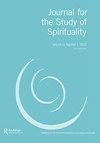The insurmountable darkness of love: Mysticism, loss, and the common life
IF 0.8
0 RELIGION
引用次数: 0
Abstract
responses when integrating spirituality and religion into our social work practice. A key concern often raised when considering the inclusion of religion and spirituality in social work is that of individual bias and how the biases and beliefs of individual students, lecturers or practitioners will be ‘pushed upon’ students/clients/service-users/colleagues. The strong focus on critical reflective/reflexive practice, encouraging one to identify and challenge biases and to be open and inclusive of other approaches to religion and spirituality as outlined in this text, responds directly to these concerns. As does the significant emphasis on social justice and ethical practice. The dedicated attention to and inclusion of First Nations’ knowledge helps to address issues of cultural competence and anti-discrimination and is particularly relevant for practice in the Australian context (and other colonised countries). Such critical practice was addressed directly and practically in this text as Gardner states, ‘I am starting here with First Nations’ knowledges partly to affirm this equality of place and to seek to redress the balance of these so often being seen as an “add on” rather than a fundamentally important way of seeing the world’ (p. 46). These are notable accomplishments of the text, making a valuable contribution to the social work knowledge base. A critique of Gardner’s critical spiritual practice is that it seems to be a critical approach to practice that allows for the exploration of religion and spirituality and how it impacts clients and practitioners through processes such as critical reflexivity rather than an inclusion of religious or spiritual ways of knowing, being and doing, in their own right. This is perhaps reflective of the concerns held by the discipline regarding the integration of religion and spirituality and, as such, lays another crucial stepping-stone on the path to social work’s inclusion of religion and spirituality in practice. This text helps move the reader along this path to inclusion and provides real-world processes and practices one can immediately begin to use in one’s own practice. Knowing the importance that religion and spirituality hold for many of those we work with, as social workers, it is imperative that we are versed in an appropriate and ethical way to respond, and Gardner’s text provides one pathway to this end.爱的不可逾越的黑暗:神秘,失去,和共同的生活
将灵性和宗教融入我们的社会工作实践时的反应。在考虑将宗教和灵性纳入社会工作时,经常提出的一个关键问题是个体偏见,以及个体学生、讲师或从业者的偏见和信仰将如何“推给”学生/客户/服务用户/同事。对批判性反思/反思性实践的强烈关注,鼓励人们识别和挑战偏见,并对本文概述的其他宗教和灵性方法持开放和包容的态度,直接回应了这些担忧。对社会正义和道德实践的重视也是如此。对原住民知识的关注和包容有助于解决文化能力和反歧视问题,这对澳大利亚(和其他殖民国家)的实践尤其重要。这种批判性的实践在本书中得到了直接而实际的阐述,正如加德纳所说,“我从原住民的知识开始,部分是为了肯定这种地方的平等,并寻求纠正这些经常被视为‘附加’而不是看待世界的根本重要方式的平衡”(第46页)。这些都是值得注意的成就,为社会工作知识库做出了宝贵的贡献。对Gardner批判性精神实践的批评是,它似乎是一种批判性的实践方法,允许探索宗教和灵性,以及它如何通过批判性反思等过程影响客户和从业者,而不是包含宗教或精神的方式,以自己的方式认识,存在和行动。这也许反映了该学科对宗教和灵性融合的关注,因此,为社会工作在实践中融入宗教和灵性的道路奠定了另一个关键的垫脚石。这篇文章有助于移动读者沿着这条路径的包容,并提供现实世界的过程和做法,一个人可以立即开始在自己的实践中使用。作为社会工作者,我们知道宗教和精神对我们工作的许多人的重要性,我们必须精通一种适当和道德的方式来回应,加德纳的文本提供了一条达到这一目的的途径。
本文章由计算机程序翻译,如有差异,请以英文原文为准。
求助全文
约1分钟内获得全文
求助全文
来源期刊

Journal for the Study of Spirituality
RELIGION-
CiteScore
2.50
自引率
7.10%
发文量
25
期刊介绍:
Journal for the Study of Spirituality is a peer-reviewed journal which creates a unique interdisciplinary, inter-professional and cross-cultural forum where researchers, scholars and others engaged in the study and practices of spirituality can share and debate the research, knowledge, wisdom and insight associated with spirituality and contemporary spirituality studies. The British Association for the Study of Spirituality (BASS) organises a biennial international conference and welcomes enquiries about membership from those interested in the study of spirituality in the UK and worldwide. The journal is concerned with what spirituality means, and how it is expressed, in individuals’ lives and communities and in professional practice settings; and with the impact and implications of spirituality in, and on, social policy, organizational practices and personal and professional development. The journal recognises that spirituality and spiritual values can be expressed and studied in secular contexts, including in scientific and professional practice settings, as well as within faith and wisdom traditions. Thus, Journal for the Study of Spirituality particularly welcomes contributions that: identify new agendas for research into spirituality within and across subject disciplines and professions; explore different epistemological and methodological approaches to the study of spirituality; introduce comparative perspectives and insights drawn from different cultures and/or professional practice settings; aim to apply and develop sustained reflection, investigation and critique in relation to spirituality and spiritual practices; critically examine the values and presuppositions underpinning different forms of spirituality and spiritual practices; incorporate different forms of writing and expressions of spirituality.
 求助内容:
求助内容: 应助结果提醒方式:
应助结果提醒方式:


